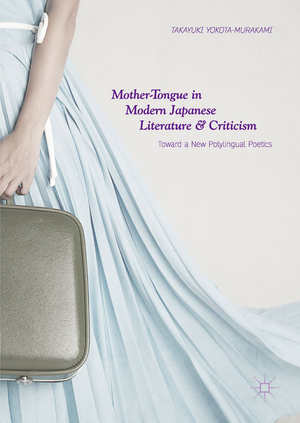Mother-Tongue in Modern Japanese Literature and Criticism: Toward a New Polylingual Poetics
Autor Takayuki Yokota-Murakamien Limba Engleză Hardback – 9 aug 2018
| Toate formatele și edițiile | Preț | Express |
|---|---|---|
| Paperback (1) | 364.38 lei 38-44 zile | |
| Springer Nature Singapore – 16 dec 2018 | 364.38 lei 38-44 zile | |
| Hardback (1) | 526.50 lei 6-8 săpt. | |
| Springer Nature Singapore – 9 aug 2018 | 526.50 lei 6-8 săpt. |
Preț: 526.50 lei
Preț vechi: 619.42 lei
-15% Nou
Puncte Express: 790
Preț estimativ în valută:
100.75€ • 105.45$ • 83.85£
100.75€ • 105.45$ • 83.85£
Carte tipărită la comandă
Livrare economică 31 martie-14 aprilie
Preluare comenzi: 021 569.72.76
Specificații
ISBN-13: 9789811085116
ISBN-10: 9811085110
Pagini: 151
Ilustrații: XV, 183 p. 2 illus.
Dimensiuni: 148 x 210 mm
Greutate: 0.39 kg
Ediția:1st ed. 2018
Editura: Springer Nature Singapore
Colecția Palgrave Macmillan
Locul publicării:Singapore, Singapore
ISBN-10: 9811085110
Pagini: 151
Ilustrații: XV, 183 p. 2 illus.
Dimensiuni: 148 x 210 mm
Greutate: 0.39 kg
Ediția:1st ed. 2018
Editura: Springer Nature Singapore
Colecția Palgrave Macmillan
Locul publicării:Singapore, Singapore
Cuprins
Introduction Theoretical Presumptions and Comparative Perspective.- Mother-tongue and the Formulation of the National Language in Meiji Linguistics.- Gembun-itchi Movement: The Creation of a Linguistic State Apparatus.- Korean-Japanese Writers and the Redefinition of Bokoku-go.- Dialectal Literature as Bilingual Literature.- Contemporary Bilingual/Exophonic Writers and Their Politics.- Deconstructing Language as a Ground for Mother-tongue.- Conclusion.
Notă biografică
Takayuki Yokota-Murakami (PhD, Princeton) is Associate professor in Comparative Literature at Osaka University, Japan. His publications incldue Don Juan East/West: On the Problematics of Comparative Literature (1998) and the award-winning Iro-otoko no kenkyu (2007). He is also the co-editor of the volume Policing Literary Theory (2017).
Textul de pe ultima copertă
This book examines how early research on literary activities outside national literatures such as émigré literature or diasporic literature conceived of the loss of ‘mother-tongue” as a tragedy, and how it perpetuated the ideology of national language by relying on the dichotomy of native language/foreign language. It transcends these limitations by examining modern Japanese literature and literary criticism through modern philology, the vernacularization movement, and Korean-Japanese literature. Through the insights of recent philosophical/linguistic theories, it reveals the political problems of the notion of “mother-tongue” in literary and linguistic theories and proposes strategies to realize genuinely “exophonic” and “translational” literature beyond the confines of nation. Examining the notion of “mother-tongue” in literature and literary criticism, the author deconstructs the concept and language itself as an apparatus of nation-state in order to imagine alternative literature,genuinely creolized and heterogeneous. Offering a comparative, transnational perspective on the significance of the mother tongue in contemporary literatures, this is a key read for students of modern Japanese literature, language and culture, as well as those interested in theories of translation and bilingualism.
Caracteristici
Examines the notion of “mother-tongue” in Japanese literature and literary criticism Considers modern Japanese literature and literary criticism through modern philology, the vernacularization movement, and Korean-Japanese literature Reveals the political problems of the notion of “mother-tongue” in literary and linguistic theories
